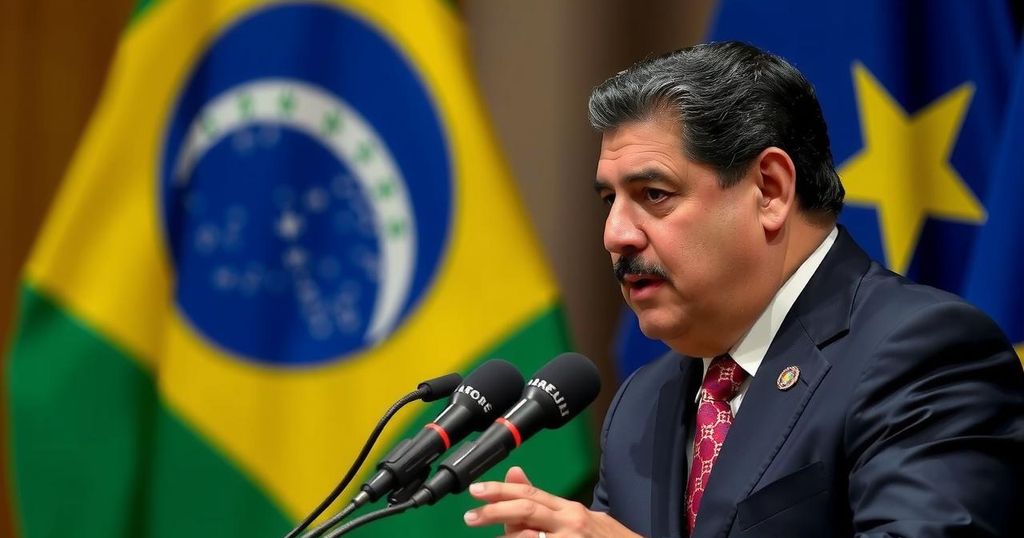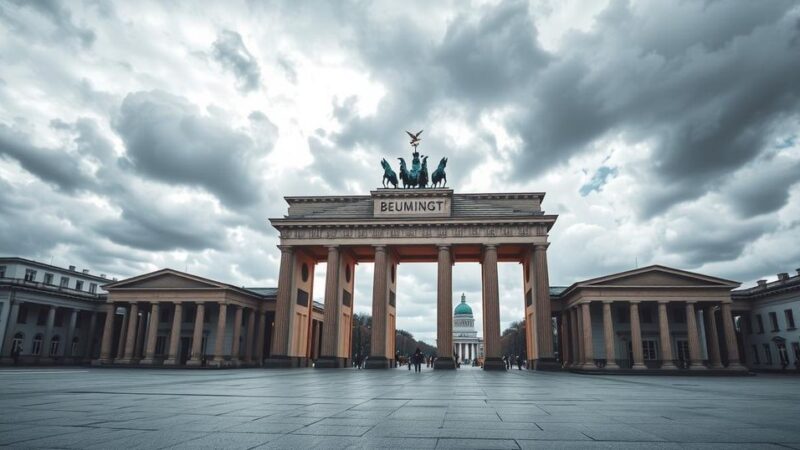Venezuelan President Nicolás Maduro announced that Brazil’s diplomat vetoed Venezuela’s entry into the BRICS bloc, contradicting earlier assurances from Brazil’s foreign minister. This exclusion exacerbates tensions between Venezuela and Brazil, particularly following a disputed election in Venezuela. Maduro sought BRICS membership as a potential economic lifeline from U.S. sanctions, emphasizing the importance of the BRICS bank as a source of alternative finance.
In a recent television broadcast, Venezuelan President Nicolás Maduro addressed Venezuela’s exclusion from the BRICS Summit, alleging that Brazil’s foreign service reneged on a previous commitment. Maduro emphasized that he had received assurances from Brazilian Foreign Minister Mauro Viera that Brazil would not oppose Venezuela’s entry into the group. Despite these assurances, a Brazilian diplomat, Eduardo Paes Saboia, reportedly exercised a veto against Venezuela’s membership just before the summit concluded. Maduro characterized this action as a “stab in the back,” identifying Paes as someone aligned with the far-right, referencing his ties to former Brazilian President Jair Bolsonaro. Maduro further criticized Brazil’s Itamaraty foreign service for its perceived historical allegiance to U.S. interests, stating that it has significantly influenced Brazil’s foreign policy decisions. The surprise exclusion of Venezuela from BRICS has intensified diplomatic strain between Caracas and Brasilia, which is already fraught following discontent over the recent Venezuelan elections. Brazilian President Luiz Inácio Lula da Silva had been mediating disputes surrounding the elections that declared Maduro the winner amidst allegations of fraud, yet had refrained from making any statements on how this veto might affect bilateral relations. Maduro had long sought BRICS membership as a means to secure economic support amid stringent U.S. sanctions crippling Venezuela’s economy. He particularly underscored the significance of the BRICS bank as an alternative financing institution during the summit, appealing for the bloc to facilitate new financial systems resistant to Western influence. The recent sanctions have hindered Venezuela’s oil exports significantly, obliging it to rely on dubious intermediaries and heightening corruption risks within its oil sector. The Kazan summit ultimately welcomed thirteen new partner countries while leaving out Venezuela, prompting Maduro to call for patience as he awaits a response from President Lula regarding this incident.
The BRICS coalition represents a collection of emerging economies seeking to establish a multipolar global order, contrasting the prevailing dominance of Western powers. Comprising original members Brazil, Russia, India, China, and South Africa, as well as newer partners including Egypt and Iran, the group aims to create a framework for collaborative development and financial independence. Venezuela has historically sought to align itself with BRICS due to the economic challenges posed by U.S. sanctions, perceiving potential entry as a means to bolster its economy and enhance diplomatic relations. Maduro’s connection with BRICS represents a significant strategic pivot aimed at negotiating more favorable terms for international cooperation and trade, particularly in oil exports.
In conclusion, Venezuela’s recent exclusion from the BRICS Summit reflects deeper geopolitical tensions and the fragility of diplomatic commitments. President Maduro’s accusations against Brazil underscore the complexities in Latin American relations and illustrate his government’s continuing struggle against external pressures. The situation remains delicate as Maduro awaits further clarification from Brazil, amidst ongoing efforts to reestablish Venezuela’s economic footing through potential BRICS membership.
Original Source: venezuelanalysis.com






